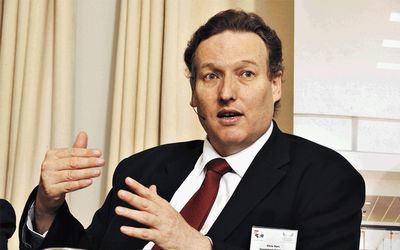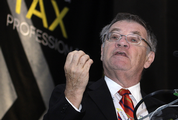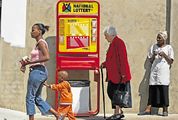Brics Summit expected to establish development bank
by Mariam Isa,
2013-03-24 15:50:23.0
THE fifth summit of the Brazil, Russia, India, China and South Africa (Brics) group of leading emerging markets in Durban next week is expected to establish a development bank that will spearhead its ambitious aim of reforming the existing political and economic world order.
Political and trade ties between the Brics countries have grown since the group was formalised seven years ago, but so far there has been no concrete institution to give it real economic relevance.
That is all likely to change at the summit on Tuesday and Wednesday, which will set up a business council to strengthen the Brics alliance and may agree on a common pool of foreign exchange reserves to provide financial support to its members in times of crisis.
"The Brics concept has been formalised as a political body but has zero economic relevance at this stage," says Investment Solutions chief strategist Chris Hart. "The disparate interests between the Brics countries mean if the concept remains political it will disintegrate — so … one of the big challenges and purpose of this summit is to achieve that relevance."
At last year’s summit in New Delhi, Brics leaders agreed in principle to establish a bank that would finance development in the roads, ports, rail, energy and telecommunications infrastructure of member states.
Finance ministers of each country have since carried out feasibility studies and will submit their findings to the summit.
Brics officials met in Pretoria in January to address the question of the bank’s viability and Brics finance ministers met on the sidelines of a Group of 20 meeting last month to discuss its potential structure.
There has been a proposal that each of the five member states will contribute $10bn in seed capital to the bank, which would then borrow from global capital markets by issuing bonds, as the World Bank does.
"Expectations that Durban will yield a relatively concrete outcome pertaining to the objective, structure and governance of the bank, which would ultimately allow for its formal establishment, are justified," Standard Bank said in a recent research note.
But researchers say it is likely to take a few years before the bank begins to operate, and in the meantime, there will be cooperation between existing development finance institutions in member states, which could include joint lines of credit.
South Africa is hoping that its top-class financial system makes the country the most attractive headquarters for the bank, but India is also making a strong case to host the institution and China could hold sway as the biggest member of the Brics group.
The other important economic issue which the Brics countries have discussed is pooling up to $240bn in foreign exchange reserves, which would be available to countries facing balance of payments difficulties.
The step would be another reflection of the growing frustration among the Brics and other developing countries with the US and Europe’s continued dominance of global institutions like the International Monetary Fund and the World Bank.
There are also plans for currency swap arrangements which would give Brics the ability to lend to each other in their own currencies, which at present are not convertible.
The Brics countries, particularly China, are keen to reduce the dominance of the dollar in international trade.
They could eventually be successful, as at present trade between the Brics and the rest of the world amounts to an estimated $5.6-trillion, or 16% of the total.
Trade between Brics countries amounts to $310bn, according to Standard Bank.
"I think that over the long term, the influence of the dollar could be reduced," says South African Institute of International Affairs economic diplomacy head Catherine Grant. "It won’t happen overnight but it will be a long-term trend."
The theme of this year’s summit is "Brics and Africa — partnerships for integration and industrialisation." Several African leaders are attending and their countries are likely to benefit from investment and trade deals struck at the event.
Nonetheless, there is a risk that expectations for the summit outcomes could be too great.
"We can’t expect too much … but we are building consensus around areas which we can find common cause on," Finance Minister Pravin Gordhan said this month.

Chris Hart, chief economist at Investment Solutions. Picture: FINANCIAL MAIL
THE fifth summit of the Brazil, Russia, India, China and South Africa (Brics) group of leading emerging markets in Durban next week is expected to establish a development bank that will spearhead its ambitious aim of reforming the existing political and economic world order.
Political and trade ties between the Brics countries have grown since the group was formalised seven years ago, but so far there has been no concrete institution to give it real economic relevance.
That is all likely to change at the summit on Tuesday and Wednesday, which will set up a business council to strengthen the Brics alliance and may agree on a common pool of foreign exchange reserves to provide financial support to its members in times of crisis.
"The Brics concept has been formalised as a political body but has zero economic relevance at this stage," says Investment Solutions chief strategist Chris Hart. "The disparate interests between the Brics countries mean if the concept remains political it will disintegrate — so … one of the big challenges and purpose of this summit is to achieve that relevance."
At last year’s summit in New Delhi, Brics leaders agreed in principle to establish a bank that would finance development in the roads, ports, rail, energy and telecommunications infrastructure of member states.
Finance ministers of each country have since carried out feasibility studies and will submit their findings to the summit.
Brics officials met in Pretoria in January to address the question of the bank’s viability and Brics finance ministers met on the sidelines of a Group of 20 meeting last month to discuss its potential structure.
There has been a proposal that each of the five member states will contribute $10bn in seed capital to the bank, which would then borrow from global capital markets by issuing bonds, as the World Bank does.
"Expectations that Durban will yield a relatively concrete outcome pertaining to the objective, structure and governance of the bank, which would ultimately allow for its formal establishment, are justified," Standard Bank said in a recent research note.
But researchers say it is likely to take a few years before the bank begins to operate, and in the meantime, there will be cooperation between existing development finance institutions in member states, which could include joint lines of credit.
South Africa is hoping that its top-class financial system makes the country the most attractive headquarters for the bank, but India is also making a strong case to host the institution and China could hold sway as the biggest member of the Brics group.
The other important economic issue which the Brics countries have discussed is pooling up to $240bn in foreign exchange reserves, which would be available to countries facing balance of payments difficulties.
The step would be another reflection of the growing frustration among the Brics and other developing countries with the US and Europe’s continued dominance of global institutions like the International Monetary Fund and the World Bank.
There are also plans for currency swap arrangements which would give Brics the ability to lend to each other in their own currencies, which at present are not convertible.
The Brics countries, particularly China, are keen to reduce the dominance of the dollar in international trade.
They could eventually be successful, as at present trade between the Brics and the rest of the world amounts to an estimated $5.6-trillion, or 16% of the total.
Trade between Brics countries amounts to $310bn, according to Standard Bank.
"I think that over the long term, the influence of the dollar could be reduced," says South African Institute of International Affairs economic diplomacy head Catherine Grant. "It won’t happen overnight but it will be a long-term trend."
The theme of this year’s summit is "Brics and Africa — partnerships for integration and industrialisation." Several African leaders are attending and their countries are likely to benefit from investment and trade deals struck at the event.
Nonetheless, there is a risk that expectations for the summit outcomes could be too great.
"We can’t expect too much … but we are building consensus around areas which we can find common cause on," Finance Minister Pravin Gordhan said this month.





















Post a comment